
Many dog owners wonder if it’s safe to share their favorite sweet treats, like gummy bears, with their furry friends. While gummy bears may seem harmless, it’s important to understand the potential risks and dangers they pose to dogs.
Key Takeaways:
- Gummy bears are not safe for dogs to eat.
- Regular gummy bears are high in sugar and can cause an upset stomach when consumed in large quantities.
- Sugar-free gummy bears often contain xylitol, an artificial sweetener that is highly toxic to dogs.
- Xylitol can lead to severe hypoglycemia and liver damage in dogs, even in small amounts.
- Choking hazards and gastrointestinal blockage are also concerns if a dog consumes gummy bears, especially the plastic packaging.
- If a dog shows any signs of illness or distress after eating gummy bears, it is crucial to seek immediate veterinary help.
- It is best to avoid feeding gummy bears or any other candies to dogs to ensure their health and well-being.
Potential Risks of Feeding Gummy Bears to Dogs
While gummy bears may seem harmless, they can pose certain risks to our canine companions. Regular gummy bears are not directly toxic to dogs, but their high sugar content can lead to an upset stomach, especially when consumed in large quantities. However, the real danger lies in the sugar-free varieties of gummy bears. These often contain an artificial sweetener called xylitol, which is highly toxic to dogs.
Xylitol can cause severe hypoglycemia, or low blood sugar, in dogs. Even a small amount of xylitol can be extremely harmful and potentially fatal. When dogs consume gummy bears with xylitol, they can experience symptoms such as vomiting, loss of coordination, seizures, and in severe cases, liver damage. Therefore, it is crucial to keep all sugar-free gummy bears, as well as other products containing xylitol, out of the reach of our furry friends.
Choking hazards and gastrointestinal blockages are also concerns when it comes to dogs eating gummy bears. If a dog ingests the plastic packaging or chews the gummy bears into small pieces, there is a risk of choking or obstruction in the digestive system. These situations can be life-threatening and require immediate veterinary attention. It’s essential to supervise our pets closely and ensure they do not have access to gummy bears or any other small, potentially hazardous items.
| Common Risks of Feeding Gummy Bears to Dogs: |
|---|
| Sugar-related upset stomach |
| Xylitol poisoning (severe hypoglycemia, liver damage) |
| Potential choking hazards |
| Gastrointestinal blockage |
In conclusion, while gummy bears may be a tasty treat for us, they can be dangerous for our four-legged friends, especially if they contain xylitol. It’s crucial to prioritize their health and well-being by avoiding feeding them gummy bears or any other candies. If you suspect your dog has consumed gummy bears or is showing signs of illness after ingesting them, it is best to seek immediate veterinary assistance. Remember, prevention is always better than cure when it comes to keeping our pets safe.

Sugar-free gummy bears might be appealing as a low-sugar alternative, but they can be highly dangerous for dogs. These candies often contain an artificial sweetener called xylitol, which can have severe health effects on our furry friends. Xylitol is highly toxic to dogs and can cause a sudden drop in blood sugar levels, leading to hypoglycemia. This can result in symptoms such as weakness, vomiting, seizures, and even liver damage.
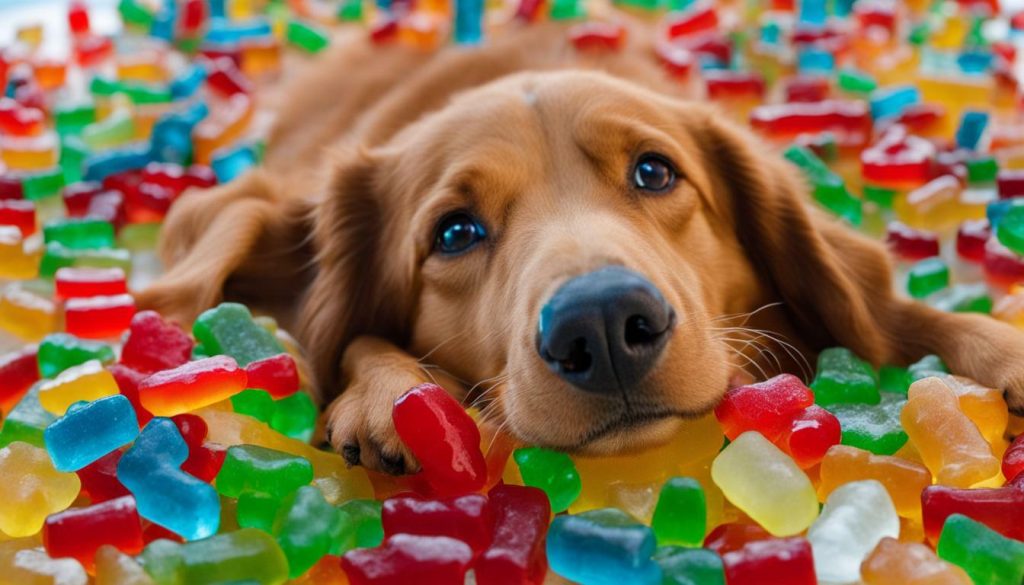
Even a small amount of xylitol can be fatal to dogs. It’s important to note that dogs metabolize xylitol differently from humans, making them more susceptible to its toxic effects. As such, it’s crucial to keep all sugar-free products, including gummy bears, safely out of your dog’s reach.
“Xylitol is highly toxic to dogs and can cause a sudden drop in blood sugar levels, leading to hypoglycemia.”
If your dog consumes gummy bears with xylitol or shows any signs of illness or distress after eating gummy bears, it is essential to seek immediate veterinary help. Time is of the essence when dealing with xylitol poisoning to prevent further complications.
In addition to the dangers of xylitol, gummy bears present other risks for dogs. The chewy texture can pose a choking hazard, especially if the dog ingests the candies too quickly or doesn’t chew them properly. The packaging of gummy bears can also be problematic if consumed, potentially leading to gastrointestinal blockages requiring medical intervention.
Summary:
- Sugar-free gummy bears containing xylitol are highly dangerous to dogs.
- Xylitol can cause hypoglycemia and liver damage in dogs.
- Even small amounts of xylitol can be fatal to dogs.
- Seek immediate veterinary help if your dog consumes gummy bears with xylitol or shows signs of distress.
- Choking hazards and gastrointestinal blockages are additional concerns if dogs eat gummy bears, especially the plastic packaging.
| Danger: | Concern |
|---|---|
| Xylitol in sugar-free gummy bears | Toxicity and hypoglycemia |
| Choking hazard | Especially if eaten quickly or not chewed properly |
| Gastrointestinal blockages | If plastic packaging is consumed |
Xylitol: A Deadly Sweetener for Dogs
Xylitol, commonly found in sugar-free gummy bears, is a sweetener that can be deadly for our canine companions. While gummy bears themselves are not directly toxic to dogs, the inclusion of xylitol in sugar-free varieties poses a significant risk to their health. Xylitol is a sugar substitute that can cause severe hypoglycemia (low blood sugar) and liver damage in dogs.
Even a small amount of xylitol can be fatal to dogs, making it crucial for pet owners to be vigilant about keeping sugary treats away from their furry friends. If a dog consumes gummy bears with xylitol or shows any signs of illness or distress after eating gummy bears, it is vital to seek veterinary help immediately.
In addition to the dangers of xylitol, gummy bears themselves can pose other risks to dogs. Choking hazards and gastrointestinal blockages are concerns, especially if a dog ingests the plastic packaging along with the gummy bears. These blockages can lead to serious complications and may require surgical intervention.
| Health Effects of Gummy Bears on Dogs | Can Gummy Bears be Toxic to Dogs? | Risks of Feeding Gummy Bears to Dogs |
|---|---|---|
| Upset stomach when eaten in large quantities | Regular gummy bears: Not directly toxic | Sugar-free gummy bears with xylitol: Highly toxic |
| Xylitol in sugar-free gummy bears can cause severe hypoglycemia and liver damage | Choking hazards and gastrointestinal blockages |
Given the potential dangers and risks, it is best to avoid feeding gummy bears or any other candies to dogs. Instead, opt for dog-friendly alternatives that are safe and nutritious. Consult with your veterinarian to find suitable snack options for your furry friend, ensuring their health and well-being.
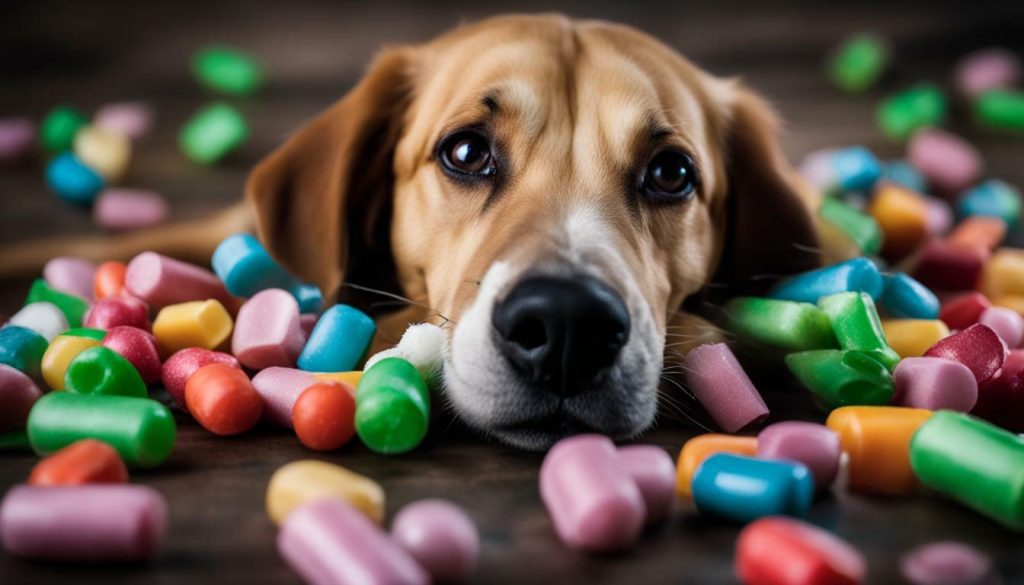
Signs of Xylitol Poisoning in Dogs
It’s crucial to be aware of the signs of xylitol poisoning in dogs, as early detection can be life-saving. Xylitol is a highly toxic substance for dogs, and even a small amount can have severe consequences.
When a dog ingests xylitol, it can cause a rapid drop in blood sugar levels, leading to hypoglycemia. Some common signs of xylitol poisoning in dogs include:
- Weakness and lethargy
- Loss of coordination
- Vomiting
- Seizures
- Tremors
- Difficulty breathing
If you suspect that your dog has ingested gummy bears with xylitol or any other product containing xylitol, it’s important to act quickly. Contact your veterinarian immediately for guidance and bring any remaining packaging or product with you to the vet clinic.
| Xylitol Poisoning Symptoms | Action Required |
|---|---|
| Weakness and lethargy | Contact a veterinarian immediately. |
| Loss of coordination | Seek emergency veterinary care. |
| Vomiting | Do not induce vomiting without veterinary guidance. |
| Seizures | Contact your veterinarian for immediate assistance. |
| Tremors | Seek emergency veterinary care. |
| Difficulty breathing | Immediately take your dog to a veterinarian. |

Remember, prevention is key when it comes to keeping your furry friend safe. Always check the ingredients of any food or treats before giving them to your dog, and avoid feeding them gummy bears or any other candies. Instead, opt for dog-friendly alternatives and consult with your veterinarian for recommendations on safe and healthy snacks for your pet.
Other Potential Dangers and Concerns
While the risks of xylitol are significant, there are other potential dangers and concerns when it comes to dogs consuming gummy bears. One of the main concerns is the high sugar content in regular gummy bears. Dogs are not designed to handle large amounts of sugar, and consuming excessive amounts can lead to an upset stomach and diarrhea.
In addition to the sugar content, gummy bears can also pose a choking hazard for dogs, especially if they are not properly chewed. The chewy texture of gummy bears can easily get stuck in a dog’s throat, potentially causing airway obstruction. This can be particularly dangerous if the dog is left unsupervised while eating gummy bears.
Another potential danger is the ingestion of the plastic packaging that gummy bears often come in. If a dog accidentally consumes the packaging along with the gummy bears, it can cause gastrointestinal blockage. This can lead to severe discomfort, vomiting, and potential surgical intervention to remove the blockage.
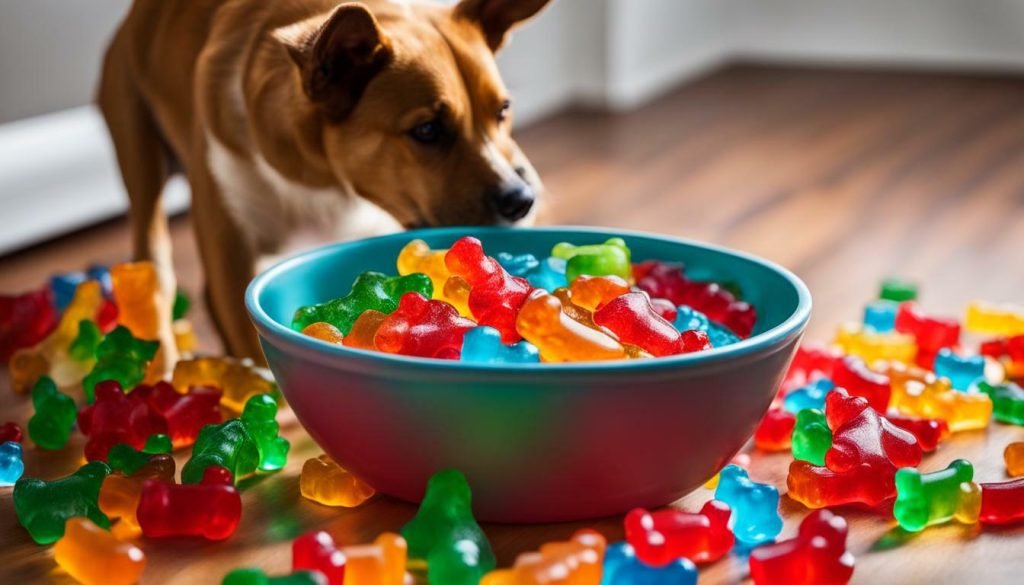
In summary, while dogs should not consume gummy bears, the risks extend beyond the dangers of xylitol. The high sugar content, choking hazards, and potential for gastrointestinal blockage all make gummy bears an unsafe snack for our furry friends. It is best to avoid feeding gummy bears or any other candies to dogs and instead opt for dog-friendly alternatives that prioritize their health and well-being.
Dog-Friendly Alternatives to Gummy Bears
If you’re looking for alternative snacks, there are plenty of dog-friendly options that will satisfy your pup’s cravings. Instead of gummy bears, try offering your furry friend some of these tasty and safe treats:
- Carrot sticks: Dogs love the crunchiness of carrots, and they are packed with vitamins and minerals. Plus, they provide a healthy alternative to sugary gummy bears.
- Apple slices: Slice up some fresh apples and share them with your pup. Just remember to remove the seeds and core, as they can be harmful if ingested.
- Peanut butter: Most dogs go crazy for peanut butter. You can spread a small amount on a Kong toy or freeze it in silicone molds for a longer-lasting treat.
Remember to always use unsalted and unsweetened peanut butter, as added sugars and salt can be harmful to dogs.
Another great option is to make your own homemade dog treats. You can find numerous recipes online that use dog-friendly ingredients like oats, pumpkin, and natural peanut butter. Not only will your pup love the taste, but you’ll also have peace of mind knowing exactly what goes into their snacks.

By offering these dog-friendly alternatives to gummy bears, you can ensure your pup’s health and happiness. Remember, it’s always best to consult with your veterinarian before introducing any new foods into your dog’s diet.
Canine Digestion and Gummy Bears
Understanding how gummy bears can impact a dog’s digestion is essential to make informed decisions about their dietary choices. While dogs have evolved to handle a variety of foods, including some fruits, certain candies like gummy bears can pose risks to their delicate digestive systems.
Gummy bears are high in sugar, which can be difficult for dogs to digest in large quantities. Consuming excessive amounts of sugar can lead to an upset stomach, diarrhea, and even pancreatitis in some cases. Additionally, the sticky texture of gummy bears can adhere to a dog’s teeth, potentially causing dental issues over time.
However, the real danger lies in sugar-free gummy bears that contain xylitol, an artificial sweetener. Xylitol is highly toxic to dogs and can disrupt their digestion, leading to symptoms such as vomiting, loss of appetite, and even seizures. It can also cause severe hypoglycemia (low blood sugar) and liver damage, which can be life-threatening.
| Gummy Bears and Canine Digestion | Health Effects of Gummy Bears on Dogs |
|---|---|
| Gummy bears can lead to upset stomach and diarrhea in dogs. | Sugar-free gummy bears containing xylitol can be highly toxic to dogs, causing hypoglycemia and liver damage. |
| The sticky texture of gummy bears can cause dental issues in dogs. | Excessive sugar consumption from gummy bears can contribute to pancreatitis in dogs. |
If you suspect your dog has ingested gummy bears, especially those containing xylitol, it is crucial to seek veterinary help immediately. The veterinarian can assess the situation and provide necessary treatment to avoid any complications and ensure your dog’s well-being.
To keep your furry friend safe, it’s best to avoid feeding gummy bears or any other candies to dogs altogether. Instead, opt for dog-friendly snacks that are specifically formulated to meet their nutritional needs. Your veterinarian can recommend suitable alternatives that will not only satisfy their cravings but also support their overall health.

If your dog has ingested gummy bears or is showing any signs of discomfort after consuming them, immediate veterinary assistance should be sought. It is crucial to remember that gummy bears, especially those containing xylitol, can pose serious health risks to dogs. Time is of the essence when dealing with potential poisoning or adverse reactions.
When you contact your veterinarian, provide them with as much information as possible, including the type and quantity of gummy bears consumed, the presence of xylitol, and your dog’s current symptoms. This information will help the veterinarian assess the situation more accurately and determine the appropriate course of action.
During the visit, the veterinarian may perform a thorough examination of your dog, conduct blood tests to check glucose levels, and monitor liver function. Treatment will depend on the severity of the situation and may include inducing vomiting, administering activated charcoal to absorb any remaining toxins, and providing supportive care to stabilize your dog’s condition.
| Signs of Xylitol Poisoning in Dogs | Other Potential Dangers and Concerns |
|---|---|
|
|
Remember: Prevention is the Best Medicine
The best way to protect your dog from the health effects of gummy bears is to prevent them from accessing these treats altogether. Keep gummy bears and other candies safely stored in a place where your dog cannot reach them. Educate everyone in your household about the dangers of feeding gummy bears to dogs, especially those that contain xylitol.
Instead of gummy bears, consider offering your dog dog-friendly snacks, such as small pieces of fruit, vegetables, or dog-approved treats that are specifically formulated for their dietary needs. Consulting with your veterinarian about the best diet for your dog is always a wise decision.
By being vigilant and proactive, you can help ensure your dog’s safety and well-being when it comes to the potential risks associated with gummy bears.
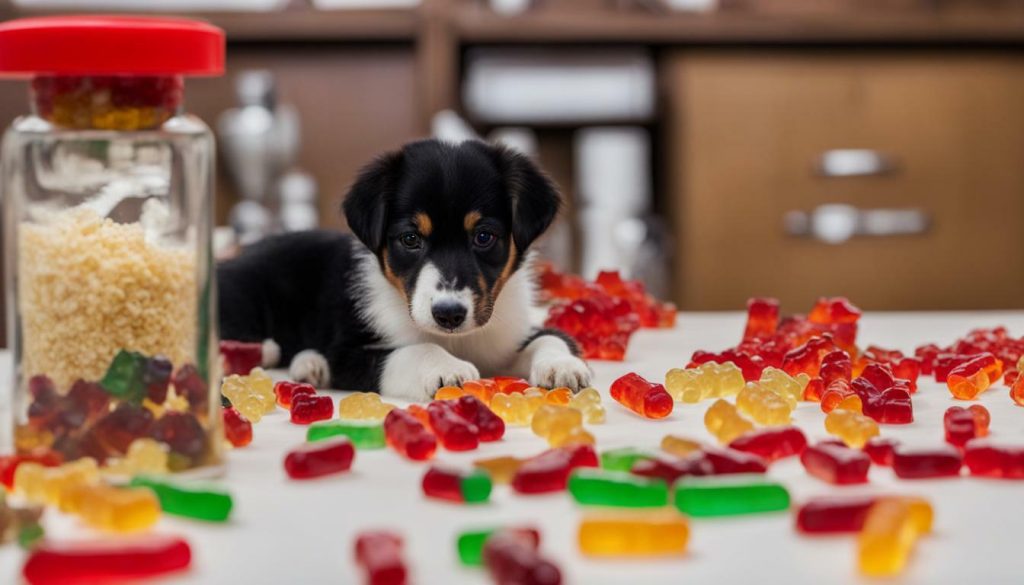
Given the potential risks and dangers associated with gummy bears, it is strongly recommended to refrain from feeding them to dogs. While regular gummy bears are not directly toxic, they are high in sugar and can cause an upset stomach when consumed in large quantities. Dogs have sensitive digestive systems, and a sudden intake of sugary treats like gummy bears can lead to gastrointestinal issues such as diarrhea and vomiting.
The real danger lies in sugar-free gummy bears, which often contain the artificial sweetener xylitol. Xylitol is highly toxic to dogs and can cause severe hypoglycemia (low blood sugar) and liver damage. Even a small amount of xylitol can be fatal to dogs. If a dog accidentally consumes gummy bears with xylitol or shows any signs of illness or distress after eating gummy bears, it is crucial to seek immediate veterinary help.
Additionally, gummy bears can pose other hazards to dogs. The small size and chewy texture of gummy bears can be a choking risk, especially for small breeds or dogs that gulp their food without chewing. Moreover, if a dog ingests the plastic packaging that gummy bears often come in, it can lead to gastrointestinal blockage, which requires immediate veterinary intervention.
Instead of gummy bears, it is important to provide dogs with safe and healthy snack alternatives. There are plenty of dog-friendly treats available that are specifically formulated to meet their nutritional needs. These treats are made with ingredients that are safe for dogs and offer a variety of flavors and textures to keep their taste buds satisfied. Always consult with your veterinarian to find suitable alternatives and ensure your dog’s overall well-being.
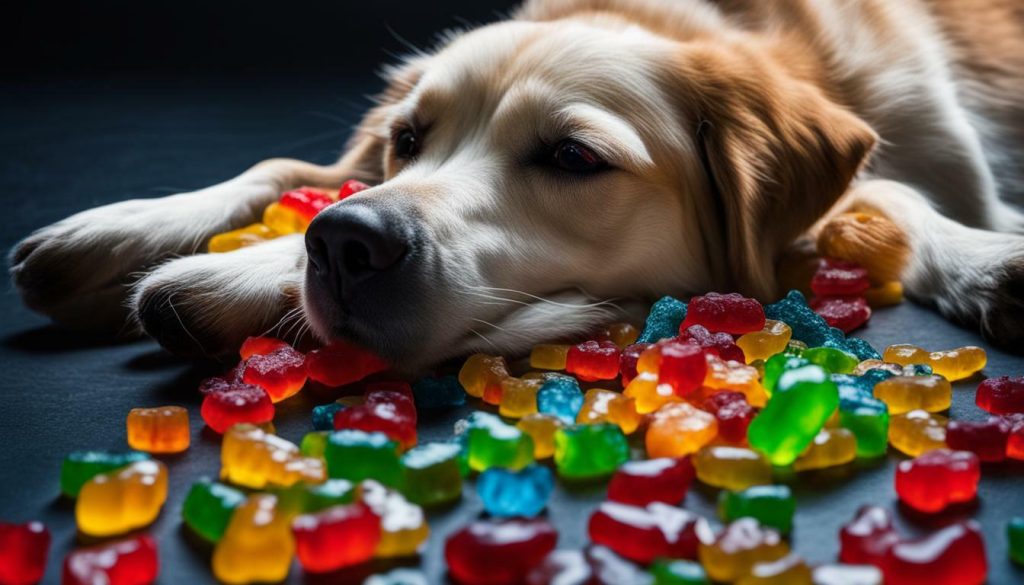
| Reasons to Avoid Feeding Gummy Bears to Dogs |
|---|
| Gummy bears are high in sugar and can cause an upset stomach for dogs. |
| Sugar-free gummy bears often contain xylitol, which is highly toxic to dogs. |
| Gummy bears can pose a choking hazard, especially for small breeds. |
| Ingesting the plastic packaging of gummy bears can lead to gastrointestinal blockage. |
| Opt for dog-friendly treats that are safe and specifically formulated for their nutritional needs. |
Conclusion
When it comes to gummy bears, it’s crucial to prioritize the safety and health of our canine companions and seek out alternative, dog-friendly treats instead. While regular gummy bears are not directly toxic to dogs, they are high in sugar and can cause an upset stomach when consumed in large quantities. It’s best to avoid giving dogs gummy bears altogether to prevent any potential digestive issues and ensure their overall well-being.
However, the real danger lies in sugar-free gummy bears, which often contain the artificial sweetener xylitol. Xylitol is highly toxic to dogs and can have severe health consequences. Even a small amount of xylitol ingested by a dog can lead to hypoglycemia (low blood sugar) and liver damage, which can be fatal.
If your dog has consumed gummy bears with xylitol or shows any signs of illness or distress after eating gummy bears, it’s crucial to seek veterinary help immediately. Time is of the essence when dealing with potential xylitol poisoning, and prompt veterinary intervention can make a significant difference in your dog’s outcome.
In addition to the risk of xylitol toxicity, gummy bears also pose other dangers to dogs. There is a potential choking hazard if a dog swallows gummy bears without chewing them properly, especially if they consume the plastic packaging as well. Gastrointestinal blockages can occur if the gummy bears form a mass in the dog’s digestive system, leading to severe discomfort and potential surgical intervention.
Given these risks and concerns, it’s best to avoid feeding gummy bears or any other candies to dogs altogether. Instead, opt for dog-friendly treats specifically designed for their nutritional needs. There are many safe and delicious alternatives available that can satisfy your dog’s cravings without compromising their health. Always consult with your veterinarian for recommendations on suitable treats and maintain a balanced and nutritious diet for your furry friend.
FAQ
Can dogs eat gummy bears?
No, gummy bears are not safe for dogs to eat.
Why are gummy bears not safe for dogs?
While regular gummy bears are not directly toxic, they are high in sugar and can cause an upset stomach when eaten in large quantities. The real danger lies in sugar-free gummy bears, which often contain the artificial sweetener xylitol. Xylitol is highly toxic to dogs and can cause severe hypoglycemia (low blood sugar) and liver damage.
Can a small amount of xylitol be fatal to dogs?
Yes, even a small amount of xylitol can be fatal to dogs.
What should I do if my dog eats gummy bears?
If your dog consumes gummy bears with xylitol or shows any signs of illness or distress after eating gummy bears, it is important to seek veterinary help immediately.
Are there other dangers if a dog eats gummy bears?
Yes, choking hazards and gastrointestinal blockage are also concerns if a dog eats gummy bears, especially if they consume the plastic packaging.
Are there dog-friendly alternatives to gummy bears?
Yes, there are many dog-friendly snack options available that are healthier and safer for dogs to consume.
Can dogs digest gummy bears?
Dogs’ digestive systems may not be equipped to handle gummy bears, which can lead to potential digestive issues.
Should I seek veterinary help if my dog eats gummy bears?
Yes, it is important to seek veterinary help if your dog has consumed gummy bears, especially if they contain xylitol, or if your dog exhibits any signs of illness or distress.
Why is it best to avoid feeding gummy bears to dogs?
Feeding gummy bears or any other candies to dogs can have negative health effects and pose various risks to their well-being.





